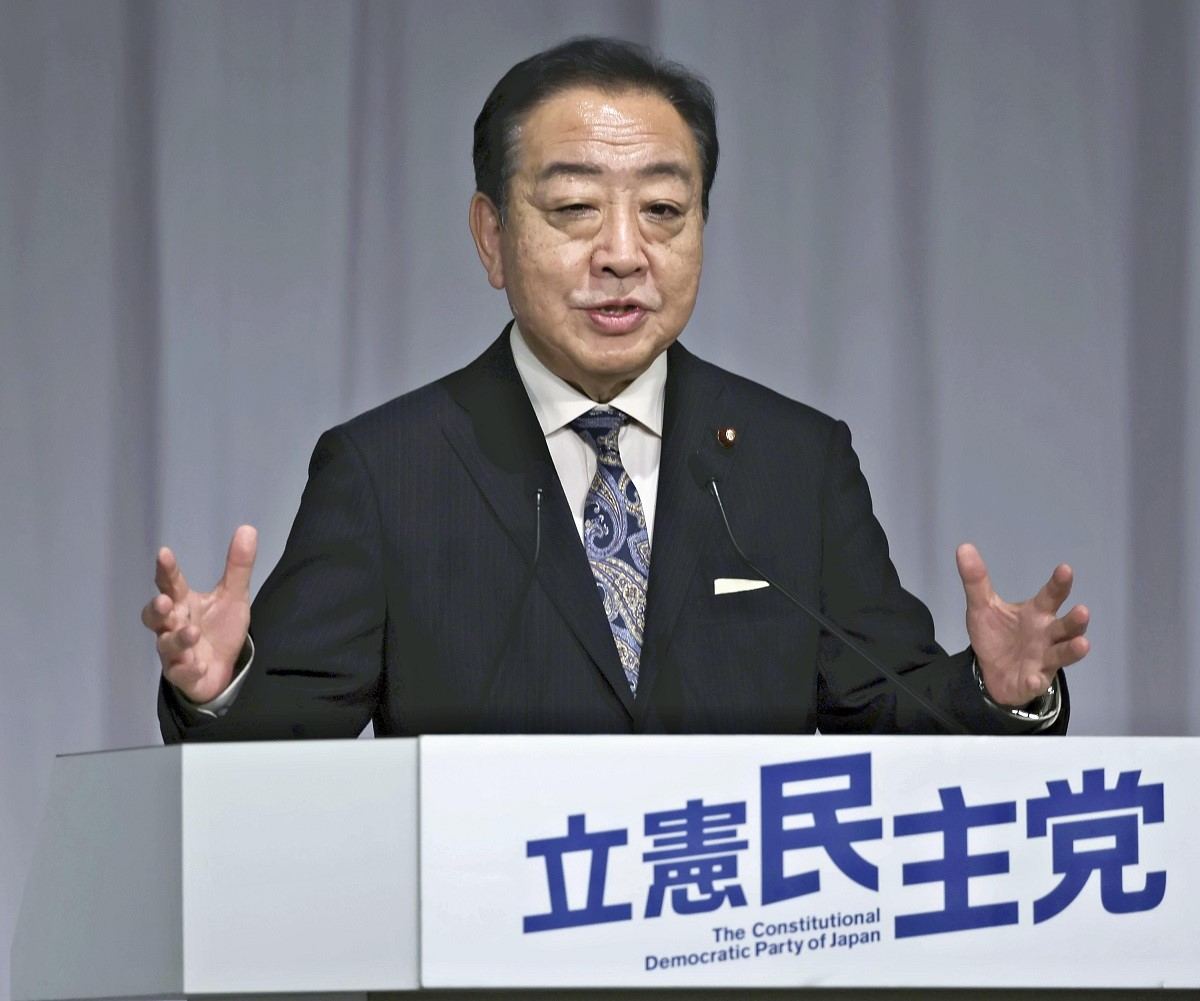Japan’s Lower House Dissolution Becomes Focal Point in LDP Election After Ex-Prime Minister Noda Chosen to Lead Opposition CDPJ

Yoshihiko Noda speaks at a press conference after being elected as the new leader of the Constitutional Democratic Party of Japan in Tokyo on Monday.
15:25 JST, September 24, 2024
There is a growing sense of caution within the ruling Liberal Democratic Party toward former Prime Minister Yoshihiko Noda, who has been elected as the new leader of the main opposition Constitutional Democratic Party of Japan.
LDP members’ concern stems from Noda’s reputation as a debater and his relatively conservative position among the opposition parties. The LDP is wary of Diet debates against Noda and a possible loss of conservative-centrist votes in the next House of Representatives election.
The LDP presidential election, with voting scheduled for Friday, will likely see renewed attention on each candidate’s strategy for dissolving the lower house and their response to the Diet.
“[Noda] has excellent debating skills,” said former party Secretary General Shigeru Ishiba, one of the candidates running for LDP president. “We must not underestimate him. He will be a very tough opponent,” Ishiba told reporters in a tense voice in Tokyo on Monday.
Some in the LDP believe that with Noda now leading the CDPJ, the extraordinary Diet session to be convened on Oct. 1 will be the first significant challenge for the new LDP president.
Noda is not only an eloquent speaker but also an experienced former prime minister. “If the new prime minister stumbles over their answers or makes gaffes, the approval rating for their Cabinet could suddenly drop,” a veteran LDP lawmaker said.
Each candidate’s position on when to dissolve the lower house is likely to attract renewed attention.
Former Environment Minister Shinjiro Koizumi, also a candidate for LDP president, has said the lower house should be dissolved “as soon as possible.” Koizumi believes that the LDP, which has caused distrust in politics, must first be judged by the public.
Koizumi likely is aware of the fact that support for the LDP typically rises due to a presidential election campaign but then declines within a month or two. If debate in the Diet drags on, the optimal timing for a dissolution will be lost.
On the other hand, the other candidates generally believe that the new Cabinet’s policies should be presented to the public through Diet debate to some extent.
“There will be a Budget Committee meeting and possibly debates between party leaders,” Ishiba said.
LDP presidential candidate Sanae Takaichi, currently minister in charge of economic security, said, “It’s quite natural [for the Cabinet] to be questioned by the ruling and opposition parties.”
LDP lawmakers around Ishiba and Takaichi said the two candidates may have confidence, as policy experts, that they will not be defeated in a debate. However, it is highly likely that the LDP will come under intense fire in the Diet over issues including the violations of the Political Funds Control Law involving LDP factions.
One of the candidates to lead the CDPJ said, “If they think they can engage in policy debates, they’re really naive.” The CDPJ is looking for an opportunity to attack the LDP.
Noda is known for his relatively conservative political stance, and there is a sense of urgency within the LDP that he will be able to capture some of the conservative-centrist votes in the next lower house election.
A middle-ranking LDP lawmaker said that unless the new president is a centrist, rather than right-wing, the loss of votes will be even worse. Noda’s inauguration as the new CDPJ leader will likely have a significant impact on the final stages of the LDP presidential race.
Top Articles in Politics
-

Japan PM Takaichi’s Cabinet Resigns en Masse
-

Sanae Takaichi Elected Prime Minister of Japan; Keeps All Cabinet Appointees from Previous Term
-

Japan’s Govt to Submit Road Map for Growth Strategy in March, PM Takaichi to Announce in Upcoming Policy Speech
-

LDP Wins Historic Landslide Victory
-

LDP Wins Landslide Victory, Secures Single-party Majority; Ruling Coalition with JIP Poised to Secure Over 300 seats (UPDATE 1)
JN ACCESS RANKING
-

Producer Behind Pop Group XG Arrested for Cocaine Possession
-

Japan PM Takaichi’s Cabinet Resigns en Masse
-

Man Infected with Measles Reportedly Dined at Restaurant in Tokyo Station
-

Israeli Ambassador to Japan Speaks about Japan’s Role in the Reconstruction of Gaza
-

Videos Plagiarized, Reposted with False Subtitles Claiming ‘Ryukyu Belongs to China’; Anti-China False Information Also Posted in Japan





















